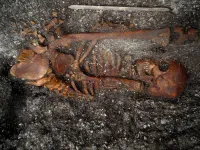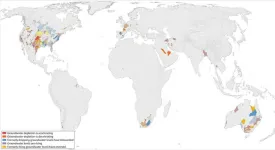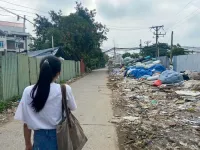(Press-News.org) R. Graham Cooks, the Henry B. Hass Distinguished Professor of Chemistry, and his postdoctoral researcher Lingqi Qiu have experimental evidence that the key step in protein formation can occur in droplets of pure water, and have recently published these findings in the Proceedings of the National Academy of Sciences (PNAS).
In this key step, amino acids are dehydrated (they lose water) even though they are in a water solution, a paradox that is resolved by the fact that these droplet surfaces are unusually dry and highly acidic. Under these conditions, amino acids connect to each other to create peptides, a fundamental step toward forming proteins and, eventually, living organisms.
A crucial aspect of the discovery is that the natural "left-handed" structure of amino acids is maintained throughout this process. This leads to the formation of pure chiral peptides with the same "L" handedness. The authors identified a specific compound, oxazolidinone, as a crucial intermediate in this reaction.
Further, they found that this dehydration reaction is not confined to microscopic droplets. It also happens on a larger, centimeter scale, as demonstrated in a lab experiment starting from the oxazolidinone intermediate. This larger-scale reaction mirrors the microdroplet chemistry and is also analogous to the well-studied wet-dry cycles that are suggested to occur in hydrothermal pools and seashores. This connection links peptide formation in aerosols and in more extensive, prebiotic environments.
The study adds to the body of evidence that the surface of water drops represents a uniquely active physical and chemical system. Present are very high electric fields and extreme acidity that drives dehydration of amino acids to form peptides. Studies of the chemistry at water droplet interfaces offer new insights into the early stages of life's chemical evolution.
The authors acknowledge valuable discussions with Purdue research associates Dylan T. Holden and Nicolás M. Morato. They also acknowledge the financial support from the Multidisciplinary University Research Initiative of the Air Force Office of Scientific Research (FA9550-21-1-0170) via Stanford University (sub-award 62741613-204669) and also support from the National Science Foundation (grant CHE-1905087).
Related Link: The fountain of life: Water droplets hold the secret ingredient for building life
END
Chemistry professor R. Graham Cooks expands research of water droplet interfaces that offer the secret ingredient for building life
2024-01-24
ELSE PRESS RELEASES FROM THIS DATE:
Brain mechanism teaches mice to avoid bullies
2024-01-24
Like humans, mice live in complex social groups, fight over territory and mates, and learn when it is safer to avoid certain opponents. After losing even a brief fight, the defeated animals will flee from the mice that hurt them for weeks afterward, a new study shows.
Led by researchers at NYU Grossman School of Medicine, the study reveals that such “retreating behavior” is influenced by a distinct area on the underside of the hypothalamus, a part of the brain that controls hunger, sleep, and levels of many hormones. The team had previously found that this special region, called the anterior ventrolateral part of the ventromedial hypothalamus (aVMHvl), ...
New tool reveals gene behavior in bacteria
2024-01-24
Bacterial infections cause millions of deaths each year, with the global threat made worse by the increasing resistance of the microbes to antibiotic treatments. This is due in part to the ability of bacteria to switch genes on and off as they sense environmental changes, including the presence of drugs. Such switching is accomplished through transcription, which converts the DNA in genes into its chemical cousin in mRNA, which guides the building of proteins that make up the microbe’s structure.
For this ...
Chemists use the blockchain to simulate over 4 billion chemical reactions essential to the origins of life
2024-01-24
Cryptocurrency is usually “mined” through the blockchain by asking a computer to perform a complicated mathematical problem in exchange for tokens of cryptocurrency. But in research appearing in the journal Chem on January 24, a team of chemists have repurposed this process, asking computers to instead generate the largest network ever created of chemical reactions which may have given rise to prebiotic molecules on early Earth.
This work indicates that at least some primitive forms of metabolism might have emerged without the involvement of ...
Fracture risk among living kidney donors 25 years after donation
2024-01-24
About The Study: This survey study found a reduced rate of overall fractures but an excess of vertebral fractures among living kidney donors compared with controls after a mean follow-up of 25 years. Treatment of excess vertebral fractures with dietary supplements such as vitamin D3 may reduce the numbers of vertebral fractures and patient morbidity.
Authors: Rajiv Kumar, M.B.B.S., of the Mayo Clinic in Rochester, Minnesota, is the corresponding author.
To access the embargoed study: Visit our For The Media website at this link https://media.jamanetwork.com/
(doi:10.1001/jamanetworkopen.2023.53005)
Editor’s ...
Contrasting characteristics and outcomes of sports-related and non–sports-related traumatic brain injury
2024-01-24
About The Study: In this study of 4,360 patients with traumatic brain injury (TBI), functional limitations six months after injury were common after sports-related TBI, even mild sports-related TBI. Persisting impairment was evident in the sports-related TBI group despite better recovery compared with non–sports-related TBI on measures of mental health and post-concussion symptoms. These findings caution against taking an overoptimistic view of outcomes after sports-related TBI, even if the initial injury appears mild.
Authors: Lindsay Wilson, ...
Syphilis-like diseases were already widespread in America before the arrival of Columbus
2024-01-24
Researchers at the Universities of Basel and Zurich have discovered the genetic material of the pathogen Treponema pallidum in the bones of people who died in Brazil 2,000 years ago. This is the oldest verified discovery of this pathogen thus far, and it proves that humans were suffering from diseases akin to syphilis – known as treponematoses – long before Columbus’s discovery of America. The new findings, published in the scientific journal Nature, call into question previous theories concerning the spread of syphilis ...
Global groundwater depletion is accelerating, but is not inevitable
2024-01-24
(Santa Barbara, Calif.) — Groundwater is rapidly declining across the globe, often at accelerating rates. Writing in the journal Nature, UC Santa Barbara researchers present the largest assessment of groundwater levels around the world, spanning nearly 1,700 aquifers. In addition to raising the alarm over declining water resources, the work offers instructive examples of where things are going well, and how groundwater depletion can be solved. The study is a boon for scientists, policy makers and resource managers working to understand global groundwater dynamics.
“This study was driven by curiosity. We wanted to better understand the state of global ...
Targeted scientific research projects to demonstrate effectiveness of ‘food is medicine’ in health care
2024-01-24
DALLAS, Jan. 24, 2024 — In an effort to identify effective food is medicine approaches for incorporating healthy food into health care delivery, the American Heart Association, the world’s leading voluntary organization focused on heart and brain health research, now celebrating 100 years of lifesaving work, today announced grants totaling $7.8 million to 19 research projects nationwide as part of its Health Care by Food™ initiative.
The research projects focus on areas including food resource coaching for patients of a safety-net clinic, delivering food is medicine interventions ...
Mass General Cancer Center announces first recipients of Krantz Awards for Cancer Research
2024-01-24
The Krantz Family Center for Cancer Research at the Mass General Cancer Center today announced the selection of 17 scientists who have been awarded a combined $6 million in funding. These competitive awards, which will be granted annually, were established to recognize the trailblazing efforts of Krantz Center scientists and accelerate ideas, projects and initiatives with the potential to fundamentally change how cancer is diagnosed and treated.
Philanthropists Jason and Keely Krantz, who ...
A large percentage of European plastic sent to Vietnam ends up in nature
2024-01-24
Despite strict EU regulations on plastic recycling, there is little oversight on plastic waste shipped from the EU to Vietnam. A large percentage of the exported European plastic cannot be recycled and gets dumped in nature. That is what new research led by Utrecht University’s Kaustubh Thapa has found.
Following the recycling path
About half of Europe’s plastic waste is exported to a number of countries in the Global South, including Vietnam. A Dutch and Vietnamese research team ventured to Minh Khai Craft Village, the largest recycling hub ...


